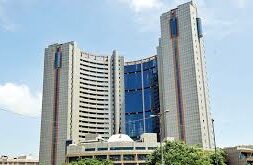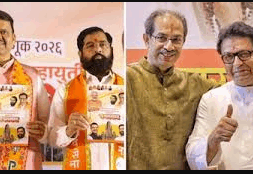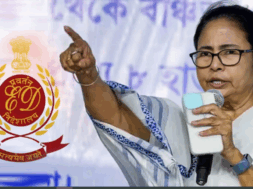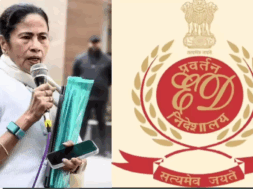
Manas Dasgupta
NEW DELHI, Feb 18: In keeping with the Supreme Court’s orders to announce within 24 hours the date for Delhi mayoral elections, the Lieutenant Governor VK Saxena on Saturday approved the Aam Aadmi Party chief and Delhi chief minister Arvind Kejriwal for convening the meeting on February 22.
In a major boost to the AAP’s prospects, the apex court on Friday had ruled that the members nominated on the Municipal Corporation of Delhi board could not have the voting rights and also asked the concerned authorities to fix within 24 hours the date for holding the elections of mayor, deputy mayor and the members of the standing committee.
The court also ruled against the BJP’s demand that the elections of the mayor, deputy mayor and the standing committee members should be held simultaneously presided over by the nominated presiding officer, a BJP councillor. The Supreme Court has ordered that the mayor’s election should be held first and the new elected mayor would take over the charge of the House before the voting for the deputy mayor and members of the standing committee.
With the AAP having secured a clear majority with 134 seats in the 250-member MCD, with the BJP having 104 seats and the Congress nine, the AAP now have a fair chance to get the posts of mayor and deputy mayor with tussle to be on for securing control of the all-important standing committee.
The BJP after losing its face in the court battle having relied on the advice of the Additional Solicitor General Sanjay Jain that under the Delhi Municipal Corporation (DMC) Act, 1957, the apex court should be convinced that restrictions on voting rights for nominated members did not apply to the “first meeting” of the House — when the internal elections for Mayor and Deputy Mayor take place — and only to subsequent meetings related to the transaction of its business. The apex court, however, was not convinced and ruled that the country’s constitution did not provide for voting rights for nominated members.
The mayoral elections have been postponed thrice in over two months amid a prolonged tussle between the ruling AAP and the Centre-appointed Lieutenant Governor over whether nominated members have the right to vote. The AAP has alleged the BJP was trying to capture the civic body by electing a BJP leader to the mayor’s post with the support of the members nominated by the LG even when AAP was the clear winner in the December election to the MCD.
The BJP sources said a section of the party leaders were against blocking the AAP’s passage to get the posts of mayor and deputy mayor through back-door methods but some senior leaders relying on Jain’s opinion believed that the offices of the mayor and deputy mayor were all for its grabbing once the Supreme Court ruled against the AAP’s stand that the nominated members could not vote.
This coterie, according to sources, was “more than convinced” that voting rights for nominated members in the mayoral and deputy mayoral polls were a natural progression of any voting rights for the nominated aldermen – which, subject to conditions, the latter have already been granted, following adjudication by the Delhi High Court in the Onika Malhotra case.
Till 2015, nominated members had no voting rights in the MCD House, nor in its ward committees, representing each of the 12 civic zones the city is divided into. Challenged by Congress alderman Malhotra, a single-judge bench of the Delhi High Court had ruled that “the petitioners being constituent members of ward committees, can participate and vote in any meeting of the respective ward’s committee.”
On December 30 last year, a week before the MCD House was scheduled to convene for its “first sitting”, the Delhi BJP got hold of ASG Sanjay Jain’s opinion on the MCD, and saw “a very good possibility” of securing voting rights for aldermen.
According to Section 35 (1) of the Delhi Municipal Corporation (DMC) Act, 1957, the Corporation “at its first meeting in each year” elects one of its members to be “the Chairperson to be known as the Mayor and another to be Deputy Mayor of the Corporation.”
The ASG’s opinion was mainly to the effect that a bar on voting rights for nominated members applied only to subsequent meetings of the MCD House and not the first meeting. The apex court, however, was not convinced of this at Friday’s hearing.
“It was only the old guard of senior Delhi unit office-bearers who were in favour of allowing the matter to linger in court, while most others wanted the Mayor and Deputy Mayor to get elected, so that the AAP, which has majority in the House, could be confronted for the failures of its government in Delhi on the Floor as soon as possible,” a Delhi BJP leader complained.
Following the Supreme Court order, which immediately triggered a huddle in the party’s state unit, the chorus for accountability to be fixed and for the heads of office-bearers pushing the strategy to roll, has gathered pace.
The challenge of the Standing Committee, however, still remains. While the Mayor is the nominal head of the civic body, it is the 18-member Standing Committee which has executive powers. The Committee has a chairperson and a deputy chairperson elected from among its members.
Having a clear majority in the Committee is crucial for any political party to have control over the policy and financial decisions of the Corporation. Six members of the committee are elected in the MCD House directly after the mayoral elections.
The formula followed is a preferential system in which the councillor getting the first 36 votes wins and the remaining 12 members are chosen by Ward Committees.
The AAP has expressed apprehension that the BJP will be able to win at least half of the 18 Standing Committee seats in case the Congress abstains from voting for the six members. The worst case scenario for the party is BJP managing 10 out of 18 seats in the Standing Committee.
“All that remains for the state unit to do now is to let the AAP get the Mayor and Deputy Mayor posts and keep its own flock of 104 councillors together, so that we get control of the Standing Committee,” a leader said.














